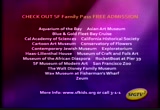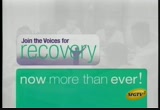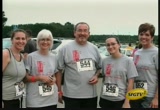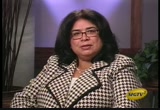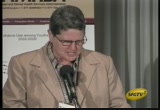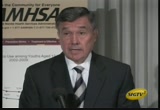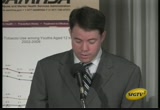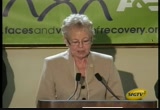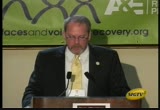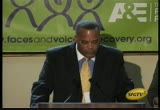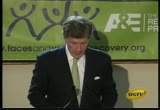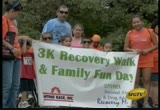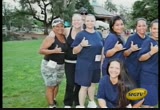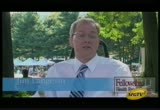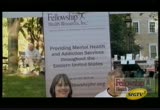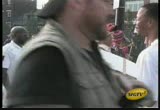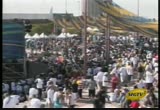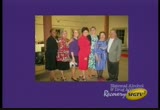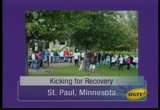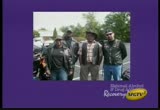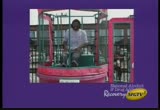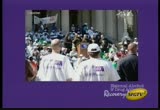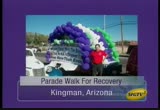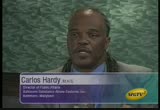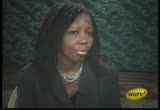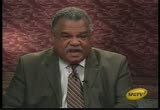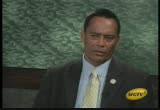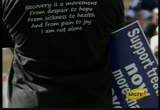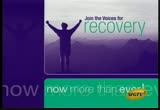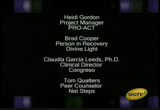tv [untitled] January 12, 2011 10:30am-11:00am PST
10:31 am
10:32 am
or indirectly from the disease of addiction, and the impact is felt in every sector of every community. fortunately, lives are saved every day through addiction treatment and recovery services and the support individuals in recovery receive from their friends, families, coworkers, and their entire community. people in recovery and those who help them to reclaim their lives is the focus of national alcohol and drug addiction recovery month. each day, an estimated 20 million people in long-term recovery prove that recovery works. they are employed, have families, pay taxes, vote, and volunteer in their community. these are americans who have reclaimed their lives and are now giving back.
10:33 am
this is the very spirit and nature of recovery month. the efforts of thousands of individuals throughout the country yielded more than 900 events nationwide supporting the 2010 theme: "join the voices for recovery: now more than ever." recovery month promotes the benefits of substance use and mental health disorder treatment and recovery- for individuals, their families, and their communities. it recognizes the contributions of treatment providers and promotes the message that behavioral health is an essential component of health services, that prevention works, and that treatment is effective. people can and do recover. this year's recovery month theme is "now more than ever"- it reminds us of how much has been accomplished in these very exciting and challenging months,
10:34 am
but how much we need to focus on a wide range of issues. our principle focus on recovery month is celebrating recovery. some of you today are celebrating your own recovery by sharing your stories with others. so i applaud your willingness to take the message of recovery to those who need to hear it. you continue to be one of our most powerful tools. what began as a small and very good idea has grown into a national, mainstream, sustained, and systematic public education and support effort, all focused on the message that people recover. that message is just as relevant for people with mental disorders as it is for substance use disorders, and i am very pleased to have sahmsa's center for mental health services participating in this year's activities along with csat and csap, as we call them. getting the message of recovery right is critical because people take action based on what they hear and see and, most importantly, what they experience.
10:35 am
experience shapes our knowledge, our values, our attitudes, our beliefs, and our action. i have this wonderful job in which the drug problem is an equality opportunity problem. it doesn't really care about sex or race or ethnicity. and you know what? the drug problem doesn't care whether it has a "d" after it or an "r" after it or any other party affiliation. this is a national problem. we have to work much harder, and we should take this report that sahmsa did, should take this report for the wakeup call for which it is. wow, the national recovery month press conference here at the national press club- exciting, exciting opportunity. i'm very familiar with the press. believe it or not, i received a little press a few times in my active addiction. you laugh, but it's true. but i think the important thing is, now i am getting press
10:36 am
as a result of my recovery, about sharing my recovery story with others. this annual event is so important because in addition to alerting americans about the dangers and trends of drug abuse, we must also educate them about the reality of recovery. having people like me who've been through the trials of addiction and found recovery, telling our stories, it's an important part of broadening social understanding and building broad public support for our cause. this is the 21st annual observance of national alcohol and drug addiction recovery month, and faces and voices of recovery is honored to be able to share this day and this lunch with you. we're really grateful, as a matter of fact, that you've taken the time to be with us, and as you'll hear throughout the program, the theme for today's luncheon is "our stories have power." as people in recovery, as family members, friends, and allies.
10:37 am
for more than 20 years i managed to look pretty good on the outside, but inside i was drowning in fear, loneliness, chaos, and just plain hopelessness. no amount of alcohol could fill that black hole that was right here. my recovery journey has been nothing short of amazing, filling me with peace, hope, love, and, most important, purpose. in short, it's been a life beyond my wildest dreams. my four children have found their own pathways to recovery, and their children, my six grandchildren, i'm proud to say, are addiction free. (applause) it looks like the cycle has been broken in my family. our stories have power, my story has power.
10:38 am
the more that policymakers, our neighbors and friends and employers understand and know that we can and do get well, the more people will seek help that they and their loved ones need in order to recover. everyone has a right to recover from addiction and to find a life in the community. as we leave here today, celebrating the 21st anniversary of the national alcohol and drug addiction recovery month, let's rededicate ourselves to using our stories to speak with one voice about the reality of recovery and build strong recovery-committed communities across the country. your stories and efforts are more important than before, gaining access to treatment and peer and other recovery support services doesn't mean that people will seek them. you will help them seek them, you will help professionals and primary care and other aspects
10:39 am
of the health care delivery system address the issue. you need to continue your efforts to keep the story of recovery out there, both within your communities and within the governmental organizations. when we address addiction from a recovery aspect, we must take a holistic approach. to truly assist an individual seeking long-term recovery, we must address the issues of education, employment, and, most importantly, family and community wellness. mental illness and substance abuse are health care conditions, and, as health care conditions, people should expect to get better, just like you and i will go to our health care provider- we expect to get better, maybe not cured, but get better. and people should hope that that's the case. and too often in the past that was not the message we gave. the second piece, and the one that i think played more of a role, is that the input of individuals
10:40 am
and families in care is essential to understanding what is best for the service system. (applause) and how great it is to be with so many faces and voices of recovery, to see so many of you here today. today is a day for us to celebrate. today we celebrate all people in recovery, we celebrate the many blessings and the great joys of recovery. i want to thank all of you who worked with senator kennedy and senator domenici as well as patrick kennedy and me to pass the mental health and addiction treatment equity act 2 years ago. believe me, your 10,000 phone calls made a huge difference, and thank you from the bottom of my heart for your effort to pass that legislation. we did it, working together, we did it. (applause)
10:41 am
(music) america is a country built from diverse people coming together. when millions of americans stand up together to make a difference in their community, they speak with one voice, and lives are forever changed. recovery month is a great example of this collective unity. in 2010, more than 900 events held throughout the country were posted on the recovery month web site. there were walks, runs, fairs, concerts, picnics, art displays, educational events, motorcycle rides, baseball games, and many other types of events that reached millions of americans. individuals touched by addiction and now healed through recovery stood together in support of one another,
10:42 am
showing that there is hope and that recovery is possible. i'm very proud of this collaboration, but, more importantly, you, too, should be proud. your work and commitment to make recovery month a success is remarkable. i'd like to thank all of the recovery month planning partners for their partnership and leadership as well as the many volunteers, friends, and families of the recovery community who made these events possible. we're at recovery day here at roger williams park in providence, rhode island, and it's the state celebration of recovery day for people with mental illness and addictions. it's a wonderful time for all of our clients and staff to come out and be part of the larger community. it's just a wonderful day for people to come out and share their stories of recovery, and it's a very hopeful, fun time for people.
10:43 am
we started actually 8 years ago holding a recovery event in rhode island. it's a way which we give a voice to people in recovery. it's a way for us to tell people there is hope, that treatment does work. there's entertainment and speakers, the bands are playing, and clients are having a really great time. and we're meeting with politicians and other mental health providers. these types of events are important to highlight. it's important because we are educating the public about both mental health issues and substance abuse issues. we're also, by holding these types of events, we're also working to reduce the stigma associated with mental health or substance abuse issues. this year, we're tying it into waterfire. we're taking the light of remembrance from here out into the general public out into waterfire, the 20,000 people that are there to basically say, each of us is important, each of us has a voice, and this issue is important. it raises a level of awareness to have an event
10:44 am
such as this associated with waterfire, which has a great reputation. we took it out of an indoor facility, because we wanted to give the message that we're not hiding. that the face of recovery needs to be out in the open. we need to dispel the myth and the stigma of substance abuse and mental illness. we are always looking to help people improve the quality of their lives, and recovery is not necessarily a straight-line process for most people, and we try to provide as much encouragement for people as possible. i think it's a huge success. i mean, i've been here each year that they've done it- the numbers grow. this particular event is gaining momentum each year. stigma still exists in the world, and the more events that we have like this and bring mental health issues into the forefront, the more people understand that our consumers are just like everyone else.
10:45 am
(music) this is our 10th annual walk. and this is clearly our biggest annual walk. and it has been growing momentum each year. [walk, ladies, walk, i see you all.] the first year we had 100 people show up, and so we're really gratified that now this year we have probably over 11,000 who have come. this event is about recovery and demonstrating to the public and for ourselves that recovery is possible. if we want to advance our cause, which is making it possible for more people to get the help that they need so that they, too, can recover, we need to really continue events like this and show people the importance of recovery in our community. i think people in early recovery have an opportunity especially to see the magnitude of
10:46 am
the recovering community and the power that's involved. [who does recovery benefit?] [everyone. everybody.] [who does recovery benefit?] [everybody.] it's a beautiful thing that this many people that lived the lifestyle that we all have lived, and decided to make a change in their lives, and turn their lives all the way around and try to be the best people that we can be. and from what i understand of it, it's working. i mean, it speaks for itself, look. look around. events like this, you see other providers- it reinvigorates your mission and your vision for a wonderful future without having to use substances. a healthy future. when you're in your addiction, you kind of feel like you're alone and there's nobody there to help you, but something like today kind of shows you that you're not alone and there is help out there. and there's a lot of people that are just like you. (music) in honor of recovery month, the drug and alcohol consortium held a recovery celebration.
10:47 am
the event started with a motorcycle ride in fort wayne, indiana, and ended with a day of fun activities. participants also enjoyed bingo, music, food, and fellowship. recovery advocates in new orleans, louisiana, joined together for a red carpet event premiering the documentary film, "highway to healing: re-thinking addiction in louisiana." following the screening was a red carpet recovery walk saluting all the courageous members of the greater new orleans and baton rouge recovery communities. the event was held at the old u.s. mint, a louisiana state museum. dawn farm hosted their 37th anniversary jamboree in ypsilanti, michigan. the event featured activities for all ages, including live music, hayrides, pony rides,
10:48 am
live and silent auctions, and tours of the 74-acre farm. the jamboree provided an opportunity to have a great time while raising awareness of the tremendous power of recovery. recovery schools and friends in st. paul, minnesota, held a kickball tournament with live music and fun for everyone! the event was held at como park where attendees enjoyed a nice day outdoors playing kickball and were able to celebrate recovery together with games, music, speakers, and information booths. the partnership for a healthy durham held a block party for the entire durham, north carolina, community at durham central park. this free event included food, diverse entertainment, games, and activities for all ages.
10:49 am
information was also provided about substance use disorders and treatment options and the inspiring stories of members of the local recovery community. the northern ohio recovery association invited all bikers down to the cleveland metroparks zoo for a recovery ride. a three-tier trophy was given to one lucky winner for best bike. the other participants were given a t-shirt, patch, and admission to the zoo. also included was food, fun, and fellowship. hundreds of oregon and washington residents celebrated recovery from alcohol and drug addiction by joining hands across the interstate 5 bridge connecting the two states. during this annual event, participants celebrated recovery with ceremonies on both the vancouver and portland sides of the columbia river.
10:50 am
citizens gathered together in york, pennsylvania, to celebrate recovery with a day at the ballpark. during the york revolution versus lancaster barnstormers ballgame, the recovery community joined together and formed the first human chain around the stadium in honor of those affected by the disease. there were fun activities along with live music, all-you-can-eat hot dogs, nachos, and soda, plus the ballgame! recovery schools and friends in madison, wisconsin, held a kickball tournament and art show for their community. attendees were able to create their own art masterpieces as well as look at other paintings, listen to stories of recovery, and enjoy each other's company. community members spread the word of recovery by wearing t-shirts promoting recovery
10:51 am
every friday during september. getting the recovery voice out there is an important goal of friends and neighbors in rock springs, wyoming. the celebrate recovery walk and rally in lansing, michigan, commemorated the successes of those recovering from addictions to alcohol and other drugs. participants joined together and marched to the state capital for a celebration featuring guest speaker and advocate, kitty dukakis. recovery friends and advocates in honolulu, hawaii, participated in a charity recovery walk and 5k run. following the run, attendees enjoyed music, food, popsicles, volleyball, and fellowship. members of the daytona beach, florida, community celebrated recovery with a motorcycle ride, entertainment,
10:52 am
testimonies, and information on supportive services. the free celebration started with a bike ride to the beautiful halifax river for a dare extreme stunt rider show with a prevention message to young people. also included in the event was a talent contest, toys for kids, food, and fun! mohave county substance abuse treatment education and prevention partnership and the kingman area meth coalition hosted a parade walk to support recovery in kingman, arizona. shirts were given out to all walkers, and there was an opportunity to carry signs promoting treatment. waianae women in recovery held a special recovery campout for women and children. there were activities for women, teens, children, and families as a whole. a fun and sober time was had by all.
10:53 am
(music) well, my passion is really advocacy around treatment and recovery issues. i've had a wonderful career over the past 16, 17 years of being a direct service provider, being a treatment and recovery advocate, to heading up a large advocacy organization to actually working inside right now. and my primary purpose is to make sure that the next person, that person that's still out there using now, when they do have this ah-ha moment, that the system is ready to welcome them and to embrace them and support them as they begin their journey of recovery. you know, working as a documentary film maker with youth, you know, has taught me a lot. and i have learned a lot, you know, just in the process
10:54 am
of giving back and educating myself to other pathways to recovery. you know, i had my experience, my personal experience in my recovery, but, you know, videotaping and capturing other stories has opened my mind to multiple pathways and different ways people recover from drugs and alcohol. i am so grateful-so, so grateful. i am the mother of five children, and i'm also a person who had child welfare issues and substance abuse disorder issues at the same time. and when i look at my children and i see how important i am in their lives and what a difference my life is now and what an inspiration i am to them. i also have a ministry, and-what i went through, we call it the test that has become the testimony. talking to people and seeing how amazed they are when i tell them my story. and to be able to inspire them and know that i'm able to do that because i'm in recovery.
10:55 am
to be able to be there for my mother, who is 92 years old, and to have her depend on me now and to know that she can depend on me, that i will show up, it's a wonderful feeling. when i began getting sober, then i had to understand that i wasn't the only one getting sober, there were 1,000 people like myself, so there was not a problem with the stigma part of it or letting the world know who i was. and the more i did that, that is also a process of helping me stay sober, reminding myself of where i came from, where i've been, where i am now, repeating that very, very often through the course of a day by helping others or by talking on the radio or what i'm doing right now, it keeps it green in my mind- of where i am and where i could be. so it really, really acknowledges in my mind that i'm doing okay today. that i'm fine today if i keep doing what i'm doing. what recovery has brought to me is an ability to take it to the next level and be vocal about it, not be ashamed, you know, not hide behind a wall
10:56 am
because you're afraid, you know, "god, they are going to know that i'm a recovering addict." well, i like to say that i'm in long-term recovery, as opposed to an addict or an alcoholic, because there's more-positive sounding. becasue people still run with, "well, addict? ooo-bad." "alcoholic? ooo-troublemaker." but long-term recovery has a nice twist to it. and if i can't give it back, i will lose it. how i pay it forward is every day i have a recovering family. my wife is in long-term recovery. we have two children, 19 and 17, that we have to role model today, not tell them how to live but show them how we lead our lives. they've never seen us pick up a drink or a drug in our life. they think recovery is an asset rather than a liability. i sponsor 17 men in recovery and try to
10:57 am
role model who i am to them. and now i am involved with intherooms.com, and we have over 80,000 members that i'm grateful to for being on our site, and we're growing every day by hundreds of people, and it's not only getting people together, keeping them connected, but we're saving lives every day. as you can see, thousands of americans participated in a variety of recovery month activities in 2010. i hope this show inspires you to organize a recovery month event next september. your continued involvement in organizing events and activities in september 2011 is critical. you can get started right now by going to recoverymonth.gov and becoming familiar with the 2011 materials. recovery month events come in all shapes and sizes. one thing they all have in common is that they all
10:58 am
bring a sense of hope that people can live healthy, happy, and productive lives. by focusing on prevention, treatment, and recovery we address the need to achieve overall health and well-being for all americans. for a copy of this program or other programs in the road to recovery series, call samhsa, at 1-800-662-help, or order online at recoverymonth.gov and click multimedia. (music) (music)
47 Views
IN COLLECTIONS
SFGTV2: San Francisco Government Television Television Archive
Television Archive  Television Archive News Search Service
Television Archive News Search Service 
Uploaded by TV Archive on

 Live Music Archive
Live Music Archive Librivox Free Audio
Librivox Free Audio Metropolitan Museum
Metropolitan Museum Cleveland Museum of Art
Cleveland Museum of Art Internet Arcade
Internet Arcade Console Living Room
Console Living Room Books to Borrow
Books to Borrow Open Library
Open Library TV News
TV News Understanding 9/11
Understanding 9/11